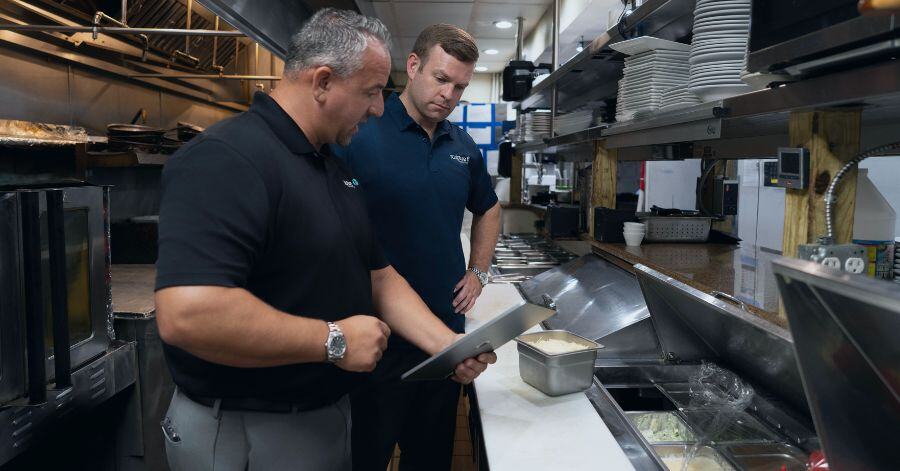Franchising can be a great opportunity for anyone wanting to dive into the business world with some guidance – or for business owners ready to grow without the stress of managing every aspect of the company themselves.
To get a better idea of whether you are ready to own a franchise, fill in the checklist on our blog - ‘Checklist: Are You Ready to Own a Hospitality Franchise?’.
If you are thinking of investing in a franchise then there are some important things to consider. Franchising has big perks but also some drawbacks that you’ll want to understand before you commit. Here’s a rundown of what you should know.
Why People Love Franchising: The Advantages
1. Jump Into a Well-Known Brand
One of the biggest appeals of franchising is that you’re not starting from scratch. No need to build a brand or create a customer base because that’s already there! Franchises offer brand recognition and a proven concept, making it less risky than going at it solo. If you’re a franchisee, you’re tapping into an established brand, and for franchisors, this brand equity is a big selling point to bring on new franchisees.
2. Training and Built-in Support
You won’t have to figure everything out on your own, which is a huge relief, especially if you’re new to running a business. Most franchisors provide hands-on training and a support system to guide you through the ins and outs of the business – from daily operations to marketing strategies. For people just starting out, this can be a real confidence booster and gives you a leg up on a smooth start.
3. Big Advertising Muscle
Marketing can be a heavy lift, especially when you’re trying to build brand recognition on a budget. But with a franchise, you’re usually contributing to a larger marketing fund, which fuels big regional or even national campaigns that benefit all locations. This pooled budget gives you professional advertising without footing the bill alone, making it easier to draw in customers and keep up with competitors.
4. Easier Financing Options
Banks and investors tend to feel more comfortable lending to franchises because the brand’s already proven successful. So, if you’re looking to get funding to jump into a franchise, you might have better luck than if you were starting a business from scratch. Lenders love a track record, and many franchises have one that shows staying power, which can make financing smoother.
5. Better Deals on Supplies
With franchises, you’re not just one buyer – you’re part of a network. This often means getting bulk discounts on supplies, equipment, and other essentials. For franchisees, this can mean lower costs on things like ingredients, packaging, and even technology. Not only does this save money, but it helps ensure consistent quality, which is key for customer satisfaction and brand reputation.
6. Lower Failure Rates
Because you’re plugging into a business that’s already successful, franchises tend to have a higher success rate than startups. You’ll have access to training, support, and a tried-and-true business model, making it easier to succeed compared to a completely independent venture.
The Disadvantages of Franchising
1. Upfront Fees and Ongoing Costs
Franchising can be pricey. You’re often looking at a big upfront investment, not just in terms of the franchise fee but also in setup costs to meet brand standards. Beyond the initial fee, you’ll also have to pay ongoing royalties and marketing fees. These recurring costs can eat into profits, so it’s essential to factor these expenses into your financial plan.
2. Limited Creative Freedom
When you’re a franchisee, you don’t have total control over how the business is run. Franchisees have to stick to the franchisor’s guidelines on how to run their business. For someone who loves innovation and flexibility, this structure can feel limiting. You’re essentially operating within the franchisor’s blueprint, so make sure you’re comfortable with the structure of the franchise you choose before diving in.
3. Tied to the Franchisor’s Reputation
The franchisor’s actions directly impact franchisees, and sometimes, that’s beyond your control. If the brand’s reputation takes a hit, every location is affected, regardless of individual performance. This brand dependence is a big consideration, especially if you prefer more autonomy in how your business is perceived by customers.
4. You’ll Have to pay Royalties
Franchisees pay ongoing royalties, often a percentage of revenue. Unlike independent business owners who can reinvest all their profits, franchisees have to allocate a portion of their revenue to the franchisor. In some cases, this can make it challenging to grow your business in the way you’d like.
5. Restrictive Contracts
Franchise contracts are long-term commitments that come with various requirements, which can limit flexibility. Franchise agreements may restrict where you operate, set renewal terms, and outline what you can and can’t do if you ever want to sell the business. Make sure you’re clear on all these terms before signing on the dotted line.
6. Potential for Disagreements
Franchisors and franchisees don’t always see eye-to-eye. Issues can arise around territory rights, royalties, or day-to-day operations, and since these contracts are long-term, it’s crucial to maintain a good relationship. If there’s a conflict, navigating it can be tricky, especially if the franchisor isn’t as responsive or flexible as you’d hope.
Is Owning a Sculpture Hospitality Franchise Right for You?
If you're drawn to the idea of owning a business that specializes in optimizing bar and restaurant profits, a Sculpture Hospitality franchise opportunity could be the perfect fit.
This franchise focuses on helping establishments improve inventory management, reduce waste, and increase profitability through data-driven solutions. But before you jump in, here are some key factors to consider to see if this unique business aligns with your interests and goals.
- A Niche Market With Strong Demand: As long as there are bars and restaurants, there’s a need for efficient inventory management. Sculpture Hospitality caters to a niche yet robust market – businesses that want to cut costs and streamline their operations. With food and beverage costs constantly fluctuating, especially in the post-pandemic era, services like those offered by Sculpture are increasingly valued. If you’re interested in working with restaurants, bars, and hotels to help them succeed, this niche could be incredibly rewarding.
- An Analytical, Results-Driven Approach: Sculpture Hospitality isn’t about selling a product; it’s about providing a service that requires a keen eye for detail and a comfort level with data and analytics. Franchisees use software and hands-on analysis to track inventory, flag potential inefficiencies, and advise clients on cost-saving strategies. If you enjoy problem-solving and are comfortable working with numbers, Sculpture Hospitality offers a data-driven, consultative role that’s less about selling and more about delivering measurable results.
- Low Overhead and Flexible Operations: Unlike many other franchises that require a storefront or physical location, Sculpture Hospitality operates with a low overhead. You can run this business from home, as it involves visiting client locations and using software to track inventory. This flexibility keeps costs down and offers you the autonomy to set your own schedule – ideal if you’re looking for a franchise that gives you a healthy work-life balance.
- Comprehensive Training and Ongoing Support: New franchisees receive in-depth training on the tools and processes used by Sculpture Hospitality, along with ongoing support. This setup ensures that even those without prior experience in inventory management can confidently step into the role. If you’re excited to learn the ropes and value the guidance of a proven system, Sculpture Hospitality’s support model could be a great match.
- Various Investment Options: One of the appealing aspects of Sculpture Hospitality is its flexible investment model, which offers options to match a range of financial goals and budgets. Unlike traditional franchise models that may require substantial initial capital, Sculpture Hospitality allows you to start small and scale up as you grow your client base and revenue. This low-entry model keeps your risk level manageable and gives you the freedom to expand your business at your own pace.
A Sculpture Hospitality franchise is more than just a business; it’s an opportunity to help local bars and restaurants thrive, all while running a scalable, flexible operation that grows as you do. If you’re ready to bring your analytical skills and business acumen to a unique franchise, Sculpture Hospitality could be a perfect fit.
Interested in learning more? Get in touch with our team today.











